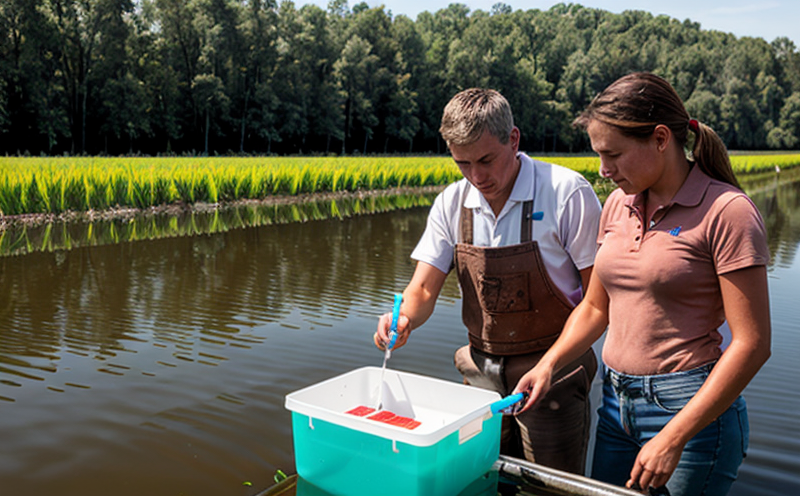Sodium Adsorption Ratio (SAR) Testing in Water
The Sodium Adsorption Ratio (SAR) is a critical parameter used to assess the salinity and irrigation water quality. In agriculture, understanding SAR levels ensures that crops receive an optimal amount of nutrients while minimizing soil salinization risks. This test is particularly important for optimizing irrigation practices in arid and semi-arid regions where excessive salinity can adversely affect crop growth.
Water with a high SAR level can lead to increased sodium ion adsorption on soil colloids, which reduces the availability of essential cations like calcium and magnesium. This imbalance can negatively impact plant health, reduce yield, and eventually degrade soil quality over time. By conducting SAR testing, farmers and agricultural professionals can make informed decisions about water usage, irrigation scheduling, and crop selection.
The test involves measuring the electrical conductivity (EC) of a soil solution in conjunction with the concentration of sodium ions. The results are then calculated using the formula: SAR = [Na⁺] / √([Ca²⁺][Mg²⁺]). This ratio helps determine whether irrigation water is suitable for specific crops and soil types, providing a quantitative measure to guide agricultural practices.
Accurate SAR testing requires precise sampling techniques and robust analytical methods. Samples are typically taken from representative areas of the field or irrigation system, ensuring that the results reflect the overall quality of the water source. Proper sample preparation is crucial; this includes filtering the water through a 0.45 micrometer filter to remove any particulate matter that could interfere with the EC measurement.
Once collected and prepared, the samples are analyzed using conductivity meters or ion-selective electrodes, which provide accurate measurements of the major ions in the solution. The equipment used must adhere to international standards such as ISO 8493:2017 for electrical conductivity and ASTM D6422-18 for ion-selective electrode methods. Reporting the results involves calculating the SAR value and interpreting it against established thresholds for different crop types.
Understanding the implications of SAR testing is essential for maintaining soil health and maximizing agricultural productivity. By integrating this test into routine monitoring, farmers can prevent potential issues before they become serious problems. Proper use of irrigation water can extend the life of soil resources, enhance crop yield, and reduce environmental impact.
Benefits
- Optimized Irrigation Practices: Ensures that crops receive the right balance of nutrients by identifying water quality issues early on.
- Potential Yield Increase: By preventing soil salinization and maintaining optimal nutrient availability, crop yields can be significantly improved.
- Sustained Soil Health: Reduces the risk of long-term damage to soil structure and fertility caused by high sodium levels.
- Compliance with Regulations: Ensures adherence to agricultural standards and guidelines related to water quality and crop irrigation.
- Economic Savings: By avoiding costly remediation efforts, farmers can save money on corrective actions that are often necessary when soil salinity becomes severe.
- Sustainable Practices: Promotes sustainable agricultural practices by providing data-driven insights into water usage and management.
Eurolab Advantages
At Eurolab, we offer unparalleled expertise in SAR testing for agriculture. Our team of experienced scientists and technicians ensures that every sample is handled with the highest level of precision and accuracy. Leveraging state-of-the-art equipment and methods compliant with international standards, our laboratory guarantees reliable and reproducible results.
We provide a comprehensive approach to water quality analysis, offering not only SAR testing but also other essential parameters such as pH levels, EC values, and trace metal concentrations. This holistic assessment allows for a more thorough understanding of the irrigation water's impact on soil and crop health.
Our commitment to excellence is reflected in our rigorous quality control processes, which include regular calibration checks and proficiency testing against recognized benchmarks. By partnering with Eurolab, agricultural professionals can trust that their decisions are based on sound scientific data, enabling them to make informed choices that enhance both productivity and sustainability.
Use Cases and Application Examples
- Crop Selection: Determine the suitability of specific crops based on their tolerance to salinity levels in irrigation water.
- Irrigation Scheduling: Adjust the frequency and volume of irrigation to match the needs of different crops, thereby optimizing resource use efficiency.
- Salt Management Strategies: Implement strategies to manage salt accumulation in soils through controlled leaching or alternative water sources.
- Soil Health Monitoring: Track changes in soil composition over time, identifying trends that may indicate long-term salinity issues.
- R&D Projects: Support research initiatives aimed at developing drought-resistant crops and sustainable irrigation techniques.
- Environmental Impact Assessment: Evaluate the broader environmental impact of agricultural practices on local ecosystems.





